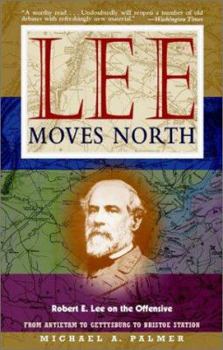Lee Moves North: Robert E. Lee on the Offensive
Select Format
Select Condition 
Book Overview
Lee Moves North "A revisionist look at Lee's career . detailed and interesting." --Orlando Sentinel "Michael Palmer says that Robert E. Lee was 145;a man of military genius'--but only when he was... This description may be from another edition of this product.
Format:Paperback
Language:English
ISBN:0471350591
ISBN13:9780471350590
Release Date:August 1999
Publisher:Wiley
Length:189 Pages
Weight:0.65 lbs.
Dimensions:0.6" x 6.1" x 9.0"
Related Subjects
Campaigns & Battlefields Civil War History Military Modern (16th-21st Centuries) StrategyCustomer Reviews
3 ratings
Lee Moves North
Published by Thriftbooks.com User , 17 years ago
I'm in no position yet to refute or substantiate the author's assertions, but he does make a compelling argument that the myth surrounding Lee has induced many scholars and buffs alike into not fully appreciating the fact that all three of Lee's attempts to take the war to the North failed to succeed, and that Lee's leadership was largely to blame. The author draws on many primary documents, often quoting from them at length, and everything is referenced so that detractors can determine for themselves just how accurately his sources were interpreted.
Lee's Offensive Strategy
Published by Thriftbooks.com User , 23 years ago
In the book's preface, Professor Palmer asks the thought provoking question "Did he and his lieutenants simply have a couple of bad days? Or were there other factors at work? ....could the strategic offensive, then be the shared thread, the common denominator that might help to explain Lee's failures?" He then reviews Lee's Maryland, Gettysburg and Bristoe Station campaigns to answer his question.In Chapter 1, Palmer states that lacking published plans and with an ambiguous objective, Lee moved into Maryland without Jeff Davis's prior approval . The author asserts that the Maryland campaign was a Federal success and allowed "the Lincoln administration to solidify its political support...." Quite the contrary happened. Aghast at the Antietam casualties, northern voters in the 1862 fall elections for governors and congressmen, gave Lincoln's party several major reverses. The chapter makes the ridiculous comparison that "Lee was one of many southerners caught up in a wave of `victory disease', not unlike that which gripped the Japanese before the battle of Midway". The Japanese defeat at Midway was not due to "victory disease" but due to their naval code having been broken and Admiral Nagumo's bad tactical decision, Nevertheless, regarding Maryland, Professor Palmer correctly writes "Why had Lee failed? The answer is simple: virtually all of the assumptions upon which he based his plans were unfounded."The Gettysburg campaign chapter is well written and objective. The review of events leading to the Gettysburg campaign is excellent. Normally given limited coverage, the narration of the meetings in Richmond with Davis and his cabinet plus the correspondence regarding Lee's Gettysburg campaign is very interesting. Palmer reviews Lee's organization problems writing "....two of the three men leading corps and three of the nine men leading divisions were untested at their new levels of commands....Such dramatic changes in the organization and leadership....suggested the need for delays, not haste." Considerable space is devoted to whether Lee wanted to fight a major battle in Pennsylvania quoting Lee stating in 1868 that "he did not want to fight" and ending with Lee biographer Emory Thomas's statement "that battle was central to Lee's plan."Palmer noted "....two fundamental forces worked against the successful execution of Lee's campaign, First....it was never was properly developed....Second, Lee relied on a very decentralized approach to command and control." Lee's decentralized command philosophy required component subordinates. Regarding the competence at Gettysburg of Lee's key commanders, Stuart, Ewell, and Longstreet , the book provides a brief review of their failures concluding that "....while Ewell's incompetence and Longstreet's recalcitrance were important factors, Lee's unwillingness to issue direct orders or to take charge of the battle lay at the root of the problem".Analysis of Lee's strategic offensive continues with a
An excellent study of Robert E. Lee's strategic failures
Published by Thriftbooks.com User , 25 years ago
Michael Palmer's analysis of Confederate General Robert E. Lee's strategic operations during the American Civil War reveals a general who was (and remains) without peer as a tactical genius, but also one who possessed dubious talents as a military strategist. Palmer focuses on three notable strategic offensives undertaken by the Confederate Army of Northern Virginia under Lee's command: The Sharpsburg campaign of September 1862, the Gettysburg campaign of June-July 1863 and the Bristoe Station campaign of late 1863. All three campaigns possessed several common characteristics: (1) A lack of proper logistical support for the forces in the field (2) The lack of a clear-cut military objective. As a consequence, all three Confederate strategic campaigns ended in a stalemate and the withdrawal of the Army of Northen Virginia from the fields of battle. In defense of Lee, it has been speculated that Lee's strategic judgement was impaired as the Gettysburg campaign began in June 1863 due to a heart ailment and that he suffered a heart attack at the height of the battle in early July 1863. In the end, these failed strategic offensives contributed - along with the Union's superior manpower reserves, overwhelming industrial production facilities and the hard-won quality of its officers and enlisted men - to the defeat of the Confederacy. Palmer's work is an excellent study of Robert E. Lee's strategic mind and is worthy of study, reflection and debate by students and scholars of the American Civil War.





